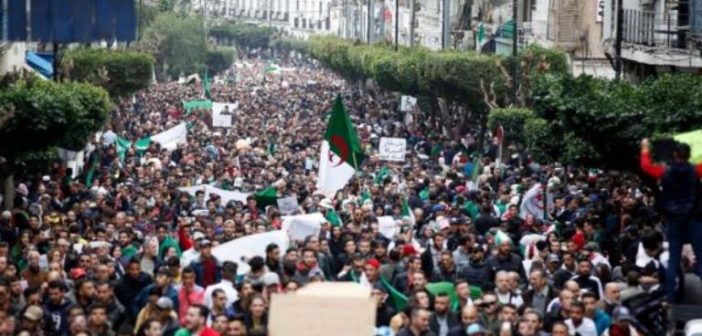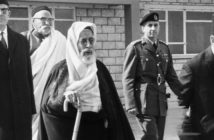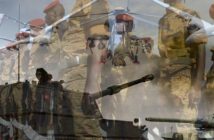After more than a month of unprecedented popular protest, Abdelaziz Bouteflika resigns. The President of the Republic of Algeria who remained in power for twenty years informed the Constitutional Council of his resignation officially on 2 April 2019, as the Algerian official news agency APS announced. “I have the honor” the former president declared “to formally notify you of my decision to terminate my term of office as the President of the Republic from today, Tuesday. This decision which I take in my soul and conscience is destined to contribute to the appeasement of the hearts and minds of my compatriots, to allow them to take Algeria towards a better future to which they legitimately aspire”.[1] Under the pressure of the street, Bouteflika had already resigned in March to put an end for his running attempt for a fifth term. In addition, he announced the postponement of the presidential election; the latter, that was normally scheduled this month, remains for an indefinite date. Nonetheless, this declaration was never enough to calm down the protestors’ yelling or to stop their massive gathering in search for a radical political transformation.
A few hours before this announcement, Algeria’s deputy defense and chief of staff of the National People’s Army, Ahmed Gaïd Salah, had declared that the constitutional procedure for dismissing the head of state from power (the article 102 of the constitution) must be “immediately implemented”. In one of the statement, the Algerian army pointed out that it considers the presidential statement of 1 April announcing the resignation of President Abdelaziz Bouteflika before the end of his term as non-authentic claiming that it did not emanate from the head of state but from a “non-constitutional and unauthorized entities’,[2] in reference to the close circle of the president. The clear position of the military institution and its call to apply article 102 has proven again the will of the military institution to end the political crisis within a constitutional formwork.
Abdelkader Bensalah, a New Interim President of Algeria.
Despite the decisive rejection shown by the street of this figure of the regime, the Algerian Parliament appointed, one week after the resignation of Abdelaziz Bouteflika, the president of the Council of the Nation as the interim president of the country according to the Algerian Constitution. At a meeting of the Algerian Parliament, Bensalah was appointed to occupy such position on Tuesday, April 9, for 90 days. Long remained in the shadows but devoted to the Algerian regime, the president of the Council of the Nation, Abdelkader Bensalah, will then replace Abdelaziz Bouteflika temporarily at the head of state. During these three months, he will have the heavy burden of organizing a new presidential election to which he will not be able to participate. “I will work to realize the interests of the people,”[3] promised Abdelkader Bensalah in his speech to the nation immediately after being appointed.
After serving as a Member of Parliament, ambassador, high-level ministerial official and senator, Abdelkader Bensalah has chaired several times the two chambers of Parliament, without ever becoming a minister. He has been then the President of the Council of the Nation, the upper house of the Algerian Parliament and equivalent of the Senate in France since 2002, just three years after the beginning of the Bouteflika presidency.[4] This function gives him the right to become an interim president of the republic in case of death, resignation or “impediment” of the President of the Republic because of a serious and lasting illness. The decision to appoint him as an interim president is therefore in line with the provisions of the Algerian Constitution. After one day of his appointment, President Abdelkader Bensalah has signed the decree convening the electorate for the next presidential election to be held on 4 Thursday 2019 as announced the presidency in a statement;[5] the presidential election that would open a new phase in the history of Algeria.
The Military Institution Calls for a Transition Phase within the Constitutional Framework.
Algeria’s deputy defense and chief of staff of the National People’s Army Ahmed Gaid Salah again spoke about the political situation on Wednesday, April 10 from Oran where he made a three-day visit. This is his first intervention since the departure of Bouteflika and the appointment of Bensalah as the interim president. He sent many important messages to the people, institutions including the judiciary, and abroad.[6]
Ahmed Gaid Salah once again insisted on the need to remain in the constitutional framework during the transition phase. He called on Algerians to “take into consideration” the fact that the conduct of the transition period requires a set of mechanisms that must be implemented in accordance with the Constitution which stipulates that the President of the Council of the Nation that the Parliament chooses with its two chambers, after the observation of the vacancy, assumes the office of head of the State for a duration of three months, with limited prerogatives, until the election of the new president of the Republic . Concretely, the army refuses to leave the framework fixed for the Constitution, at least, for the moment.
The army will “accompany” the transition phase. The transition period “will be with the support of the National People’s Army,” said Gaid Salah. According to him, the military institution “will ensure the follow-up of this phase”, with regard to “mutual trust between the people and his army”. The army will therefore ensure, according to Gaid Salah, that this period is happening “in a climate of serenity and in strict compliance with the rules of transparency and integrity and the laws of the Republic”.
In his speech, General Ahmed Gaid Salah asserted also that the socio-economic side of the crisis “will get worse if stubborn positions and unrealistic demands persist”, the fact that obligates and requires from all parties, in his view, “to be patient, conscientious and lucidity in order to realize popular demands, to guide the country towards peace and to lay the foundations for a state of law and institutions “. The phase that the country is going through “requires, or even imposes on all the children of the faithful, and civilized Algerian people, to federate the efforts of all the nationalists by following the path of wisdom, weighting and clairvoyance” he denoted affirming his conviction that “the people will understand and measure the sensitivity of the situation and will favor the national interest”.
The Algerian People Say his word in the 8th Friday of Demonstrations
A massive marches through the center of Algiers and other cities for an eighth consecutive Friday of protest, and the first since the inauguration of the interim president and the announcement of a presidential election on July 4 to designate a successor to Abdelaziz Bouteflika. The movement demanded the resignation of Bensalah, the end of the “system” and a “free and democratic Algeria”. The exact number of protesters is difficult to be precisely establish. Men, women, as well as children and many young people gathered under strong police presence early in the morning near the Grande Poste, emblematic building in the center of Algiers, which has become the heart of the anti-regime contestation since almost two months. People clearly deny the structures and personalities set up under the previous regime to be responsible for the transition, believing in particular that they cannot guarantee a free and fair election to appoint the successor of Bouteflika.[7]
The issue of organizing the upcoming presidential elections is becoming more complicated. The voice of the street, which insists on leaving the remnants of the regime, threatens to thwart the task of President Abdelkader Ben Saleh in running the stage until the election of a new president, especially after the judges threatened to boycott the elections.[8] The insistence of the popular movement on the abdication of Ben Saleh puts the presidential elections scheduled for July 4 at the crossroads. For the regime, the organization of such elections in a short period of three months according to the constitution guarantees the continuity of work of institutions and maintains the stability of the state. However, the protesters see it as a means of maintaining the ruling regime despite the departure of Abdelaziz Bouteflika. This new political impasse makes the organization of the presidential election under these circumstances very complicated, in light of the adherence of the people, who declared explicitly in the 8th Friday of protest that they do not trust the laws and institutions of the country because they will not ensure free elections since the election law is actually in favor of the regime.
Millions of protestors who went out in the last Friday represent the biggest part of the electorate. But it is interesting that this bloc today categorically rejects these elections and confirmed that it will not participate in the upcoming presidential election as it will be guided by the same figures of regime .How can decision-makers continue today to move towards presidential elections without an electorate? If the electorate abstains, then what legitimacy will the new president have?
The boycott of the electorate alone is not the only threat to the upcoming elections. The position of the judges is also a new pressure that strikes Ben Saleh’s mission in depth. There can be no transparent and fair elections without framing the judges who announced on 13 April in their statement that the review of the exceptional lists was interrupted. For refusing to participate in elections framed by a government lacking legitimacy, the front of the judges will form a new pressure sheet, threatening the task of the head of state Ben Saleh, as well as the military’s Feuille de route to get the country out from the political crisis .
Two Scenarios for Getting the Country out from the Political Impasse.
The first scenario was proposed by Opposition parties, union representatives and national figures held in Algiers; a meeting at the headquarters of the Algerian Front for Development, Freedom and Justice to propose a new roadmap to get the country out from the political crisis.[9] This new roadmap provides a short transition period of six months during which the prerogatives of the incumbent president will be transmitted to a presidential body composed of national figures known for their credibility, probity and competences. Its mission will, according to the authors of the roadmap, take charge of the demands of the people and its members will abstain from any candidacy or proposal of candidacy at the next elections. The new presidential body will also have to assume the prerogatives of the Head of State. It will be responsible for forming a government of national figures (technocrats) to manage current affairs, establish an independent national electoral organization and amend the electoral law to guarantee free and transparent elections. Opposition members who proposed this feuille de route also decided at this meeting to give their group a new name, calling it “the forces of change to support the choice of people”.
However, this roadmap is unclear and opaque. It is considered by others as a call for a violation of the constitution, which constitutes a serious threat to the functioning of the institutions of the state. Another big problem facing the roadmap presented by the opposition is how and when this presidential body will be formed, and who will be in it?! Who will accept this presidential body, who will supervise a transitional period without being elected by the people or gone through the ballot box? All of these questions make this scenario an uncalculated step that could plunge the country into deep divisions.
The second scenario, which could keep the process of democratic transition within a constitutional framework and meet the demands of the people at the same time, is the resignation of the main figure of the regime from their posts and give the opportunity to honest and acceptable personalities to lead this transition. Some political elites and constitutional experts proposed the resignation of the president of the Constitutional Council and his replacement by a national personality acceptable to the people. And then, the resignation of the current head of state, Ben Saleh, who will be replaced by the President of the Constitutional Council according to the Constitution of Algeria (article 102) . Then, the current government resigns and the new head of state (President of the Constitutional Council) will form a government of national competencies and work with all political actors to establish an independent election body to guarantee a free and transparent presidential election. This scenario would provide a political and constitutional solution at the same time for the current political impasse.
References
[1] “Démission d’Abdelaziz Bouteflika : l’Algérie entre espoirs et inquiétudes”, https://www.jeuneafrique.com/758020/ [accessed 03.04.2019].
[2] “Algeria army urges removal of President Abdelaziz Bouteflika”, https://www.bbc.com/news/worldafrica47710945 [accessed 03.04.2019].
[3] “Bensalah prend officiellement ses fonctions de chef de l’Etat”, http://www.aps.dz/algerie/87878 [accessed 09.04.2019].
[4] “Profil : qui est Abdelkader Bensalah, le président par intérim en Algérie?”, https://fr.africanews.com/2019/04/10/profil-qui-est-abdelkader-bensalah-le-president-par-interim-en-algerie// [accessed 10.04.2019].
[5] “Présidentielle : Convocation du corps électoral pour le 04 juillet prochain”, https://www.elwatan.com/edition/actualite/presidentielle-convocation-du-corps-electoral-pour-le-04-juillet-prochain-10-04-2019 [accessed 10.04.2019].
[6] “For more details see: L’ANP accompagnera la période de transition de préparation de l’élection présidentielle”, http://www.aps.dz/algerie/87897 [accessed 10.04.2019].
[7] “En Algérie, nouveau vendredi de manifestations contre le maintien du « système » au pouvoir, https://www.lemonde.fr/afrique/article/2019/04/12/nouvelle-journee-de-mobilisation-en-algerie-contre-le-maintien-du-systeme-incarne-par-abdelkader-bensalah_5449269_3212.html [accessed 12.04.2019].
[8] “Algérie : des magistrats refusent de superviser la présidentielle”, https://www.jeuneafrique.com/762794/politique/algerie-des-magistrats-refusent-de-superviser-la-presidentielle/ [accessed 13.04.2019].
[9] “Des partis de l’opposition proposent une feuille de route pour sortir de la crise”, https://www.algerieeco.com/2019/03/24/des-partis-de-lopposition-proposent-une-feuille-de-route-pour-sortir-de-la-crise/ [accessed 09.04.2019].



